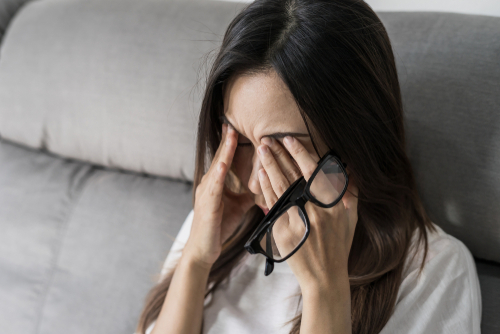5 Tips for Better Eye Care this Springin Boston, MA

After a long winter, the warmer weather of spring can be exciting. But spring also comes with its drawbacks.
While it’s lovely to see trees and flowers in bloom, you may find that pollen in the air irritates your eyes and causes you discomfort. The days are also sunnier, meaning you’re spending more time outdoors. If you have allergies, that can increase symptoms and irritation from too much sunlight. You may also find that your eyes feel drier as the weather changes.
But you can still live your best life this spring by simply taking care of your eyes. You can manage the various annoyances that come with these warmer months to be healthy and happy all season. Keep reading for 5 tips for better eye care this season!
1. Stay Hydrated

Being hydrated is extremely important. Dehydration can lead to various physical symptoms and can even be life-threatening.
However, one effect of dehydration that many people don’t consider is it can cause dry eyes. If your eyes get too dry, it can affect how they function.
Your eyes need moisture to stay healthy, and they’re constantly producing tears to flush out bacteria and other harmful substances. But when you are dehydrated, your eyes have a more challenging time making these tears. Because of this, your eyes may feel dry, irritated, gritty, and cause you discomfort.
Dry eyes can be uncomfortable, but they can also lead to serious health problems. Having dry eyes makes them more prone to infection.
Eye infections can lead to corneal ulcers, which scar your corneal tissue, leading to vision loss. The best way to avoid this chain of events is to keep your eyes from drying out in the first place.
One way to do that is by drinking plenty of water. If you know you’ll be participating in particularly strenuous activities, keep plenty of water nearby to avoid dehydration. Another way is getting the right kinds of nutrients.
2. Get Your Omega-3 Fatty Acids

The things you eat can make a big difference in keeping your eyes in good shape. Many nutrients found in food can help keep your eyes healthy.
One nutrient that helps specifically with tear health is omega-3 fatty acids. Omega-3 fatty acids encourage healthy tear production, and a symptom of omega-3 deficiency can be dry eyes.
You can get more omega-3’s in your diet by taking fish oil or flaxseed oil supplements. But your body absorbs nutrients better from food rather than pills. Try adding foods like fatty fish, walnuts, and seeds like flax seeds and chia seeds to your diet to get the most benefits.
3. Wear Sunglasses
Sunlight contains a harmful wavelength of light called ultraviolet, or UV light. You’re probably aware that UV light can damage your skin, causing sunburns.
But it can also similarly damage your eyes. Too much exposure to UV rays can be seriously detrimental to your eyes.
It can also increase your risk of developing eye cancer or pterygium, like a sunburn on your eye. Just like you should wear sunscreen to protect your skin from the sun, you should also protect your eyes.

The best way to protect your eyes from the sun’s harmful UV rays is to wear sunglasses whenever you go outside. But be aware that not all sunglasses provide the same amount of protection.
Some sunglasses aren’t tinted enough to block out a significant amount of UV light. To be sure you get the right kind of sunglasses, look for a tag or sticker when you buy them that says something like “blocks out 99% of UV light.”
If your sunglasses say this, you can feel safe knowing that they provide enough protection for your eyes while enjoying the warmer spring and summer weather. You should also remember that sunglasses are an essential component for eye protection, even if it’s cloudy.
It doesn’t have to be sunny outside to expose your eyes to UV rays. Make sure to always wear sunglasses whenever you’re outside, no matter what season.
4. Blink!

You usually don’t have to think about blinking, as it seems automatic. But your brain may not always tell your eyes to blink enough when doing certain things, like concentrating or using an electronic screen.
Blinking is essential to keep your eyes from getting too dry. When you don’t blink enough, you may start showing the symptoms of dry eye syndrome.
Too much screen time can also cause various symptoms, like eye pain, headache, and fatigue. To prevent dry eyes and other symptoms, limit your screen time and remember to blink.
If you need to spend a lot of time in front of a screen due to using a computer for work, use something called the 20-20-20 rule. The 20-20-20 rule helps remind you to refocus and blink.
The 20-20-20 rule states that every 20 minutes, you should look away from the screen to look at an object 20 feet away for 20 seconds. Taking a short break gives your eyes a quick rest and reminds you to blink.
While the 20-20-20 rule is good to use if you need to look at a screen for an extended time, taking longer breaks is always preferable. If your eyes feel dry while looking at screens, keep artificial tears or eye drops nearby to reduce irritation.
5. Don’t Rub Your Eyes
One of the worst things you can do to your eyes is rubbing them, especially in the spring. Pollen can quickly get into your eyes when you touch them, and this becomes much more common if you wear contact lenses.
If you’re allergic to tree pollen like many people are, getting it in your eyes can cause severe allergy symptoms like irritation, redness, and itching. Even if rubbing your eyes feels good in the short term, it only leads to more problems in the long term.

The more you rub your eyes, the more they’ll itch. Rubbing your eyes can also get bacteria in them, increasing your risk of eye infection.
If you have itchy eyes, try using a cold compress over your eyes. You can try over-the-counter eyelid wipes or artificial tears if they’re incredibly itchy.
See your eye doctor if your eyes remain itchy after using home remedies and over-the-counter medications. It can be tempting to rub your eyes if they’re irritated, but try your best to avoid it. Instead, make sure your eyes receive proper treatment for allergy symptoms.
Ready to conquer your dry eye symptoms this spring? Schedule an appointment at the Nielsen Eye Center in Boston, MA!
We have Patient Advocates waiting to answer the phone, so give us a call at 617-471-5665 to get answers to your questions and find the relief you need!






